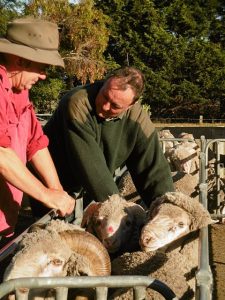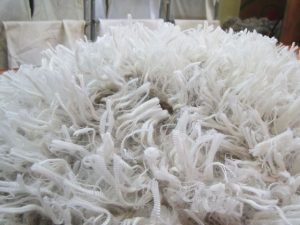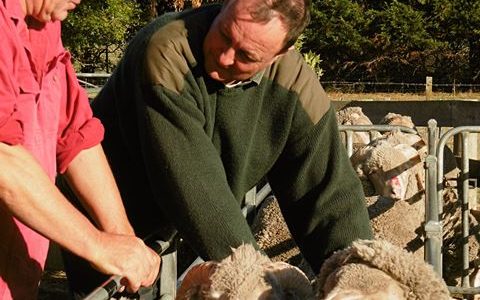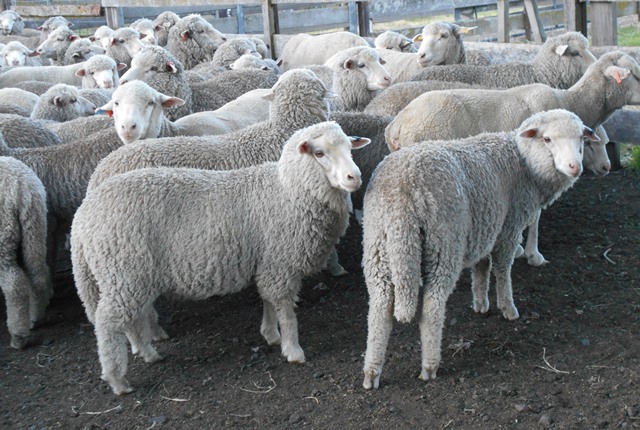Using a new innovative approach to sheep breeding, farmers are able to change from the traditional techniques for breeding superfine Merino sheep to selective breeding for smooth, soft rolling skin Merino™, commonly known as SRS® Merino.
Using the scientific principles of genetics and SRS® breeding principles, farmers can significantly advance the health and productivity of a flock, decrease animal expenses all while maintaining high-quality disease free superfine wool.
Innovative SRS® Sheep Breeding Principles
Testing of SRS® breeding principles began in the late 1980s. The attempt to create a sheep superior to the traditional Merino sheep of Australia was spearheaded by Dr. James Watts. The skin of the  Merino tends to be wrinkly, and the more wrinkles present, the larger the surface area of the skin. This translates to a greater space for wool to grow. Wrinkly sheep, however, can be difficult to shear, and they must be mulesed to protect their health.
Merino tends to be wrinkly, and the more wrinkles present, the larger the surface area of the skin. This translates to a greater space for wool to grow. Wrinkly sheep, however, can be difficult to shear, and they must be mulesed to protect their health.
Dr. Watts began selectively breeding sheep to create what is now called SRS® Merino or Merino with smooth, rolling skin. Watts examined sheep for particular objective and subjective traits, often relying on the look and feel of a sheep as an indicator of its offspring’s body type.
His aim was to create plain-bodied, wrinkle-free sheep that also had loose, thin skin. Along with that, the creature would be capable of producing fleece with not only more wool than the average Merino sheep but also wool of better quality comprised of multiple secondary fibres of a smaller diameter.
For more further information on the benefits of SRS® merino breeding, the lustrous merino fibre production on ethical merino sheep visit the SRS Merino website at https://srsmerino.com.au/the-srs-merino
Traditional Treatment for Disease-Free Fleece
Flystrike is the bane of wool sheep. Flies are naturally attracted to any discoloured wool from dermatitis on a merinos wrinkled skin to urine and faecal matter that clings to a merino sheep’s breech area. To keep merino sheep disease-free, some traditional farmers utilise practices such as mulesing and tail docking. If a sheep’s breech is neglected, flystrike can result in an infestation of blowfly maggots. Mulesing and tail docking cost money, take time and manpower, stress the animal, and defame farmers for being inhumane and unethical.
SRS® A Natural Solution for Ethical Merino
The natural traits of SRS® Merino provide an alternative to these practices with no tail docking and no mulesing. The Humane Society International (www.hsi.org.au) and Dr Jim Watts of SRS® have formed a close working relationship as a result of these advanced changes of the merino and improved animal welfare due to SRS breeding techniques.
First, their tails are shorter. They also have strength enough to effectively lift their tails when expelling waste therefore not always require their tails to be docked.
As for mulesing, the process is not needed, for the SRS® Merino generally receives a score of 1 on the Visual Sheep Scores for breech wrinkle.
At present, sheep farms do not usually begin with herds strictly made up of SRS® Merino. Instead, the herds slowly convert to the SRS Merino variety, as they are bred for the desired traits including completely eliminate the need for mulesing.
Lamb Survivability
Data continue to be collected and studied for SRS® Merinos. In this breed, the ewes often rear twins and triplets, and the survivability rate of the offspring is strong. Overall, the survivability rate halfway through gestation for the Merino industry hovers above 50%. Recent data from SRS® Merinos indicate a much higher survivability rate – sometimes exceeding 90% – over the same period of time.
Additional SRS® Merino traits contribute to a high survivability rate. The ewes nourish their offspring with a stellar milking capacity. Plus, they tend to be more docile and display a calm temperament than their Merino counterparts.
Ethical Luxury High-Quality Wool
Merino with smooth rolling skin have follicles that produce wool in a way that differs from skin that is wrinkled or skin that is taut. Instead of a single fibre growing out of a follicle, multiple fibres generate from each. The fibre  is fine. Each fibre is long with a bold crimp. These fibre properties are responsible for making the SRS® Merino wool silky and soft. Many studies laud Soft Rolling Skin™ Merino wool for being strong and quite like pure cashmere.
is fine. Each fibre is long with a bold crimp. These fibre properties are responsible for making the SRS® Merino wool silky and soft. Many studies laud Soft Rolling Skin™ Merino wool for being strong and quite like pure cashmere.
Besides excellent wool quality, SRS® Merino wool continues to impress farmers. One notable trait is that the wool actually prevents water from penetrating beyond the fleece tip. SRS® breeding results in merino fleeces made up of free growing bundles of merino wool fibre that have a growth rate that allows for three shearings every 2 years. Read more about ethical luxury superfine and ultrafine wool fleece of the BaregaMerino brand.
SRS® Principles Extend Beyond Sheep
Sheep are not the only animals to benefit from farmers using these breeding principles, both alpacas and angoras benefit in the same way as the sheep have from selective breeding. For example, alpacas are now being bred so that they are born without guard hairs. These hairs have poor density. Another pitfall of guard hairs is that they do not absorb dye for fabric. By breeding with SRS® principles, the offspring have fleece of better quality because they are without guard hairs; thus, SRS® breeding principles improve the overall yield.
Humane Reputation for SRS® Merino Sheep
Demand continues to increase for ethical wool. More consumers want products of wool from humanely-treated sheep, not products from wool that have undergone the painful processes of tail docking and mulesing. In turn, the wool industry is responding to the pressure to use ethical wool. From wool processors to clothing retailers, the wool industry is finding long term and natural solutions with innovations like the Soft Rolling Skin Merino™.
Sources
“Breech Strike.” Fly Boss. Sheep CRC Ltd., 2016. Web. 17 Aug. 2016.
Francis, Patrick. “Mulesing under Pressure from Merino Wool Value Chain Players.” Humane Society International. May 2016. Web. 16 Aug. 2016.
Stewart, Georgie. “Cruelty Going out of Fashion.” Technical Bulletin, no. 27, Humane Society International, p. 7. 2016. Web. 17 Aug. 2016.
“A Unique Breeding System.” SRS Alpaca. SRS Alpacas International, 2016. Web. 19 Aug. 2016.
Watts, James. “Introduction to SRS Merino and Fibre Genetics.” SRS Merino. 2016. Web. 16 Aug. 2016.
—. “SRS Merinos Have More Lambs and Rear More Lambs.” SRS Merino. 2016. Web. 18 Aug. 2016.
—. “The SRS Merino.” SRS Merino. 2016. Web. 16 Aug. 2016.


